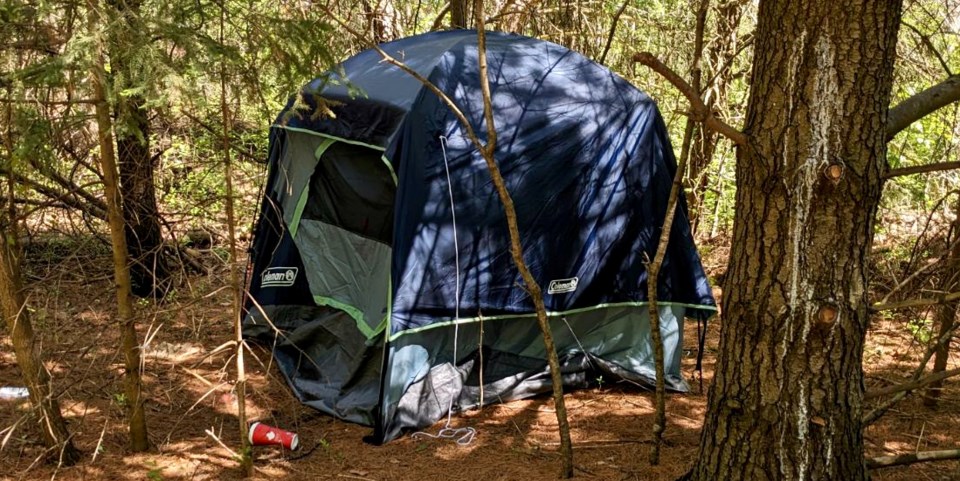As the city looks to crack down on the rising number of homeless encampments in Orillia, city council passed a new bylaw Monday that makes it an offence to set up a tent or shelter on municipal property.
The city’s municipal code formerly prohibited setting up tents and shelters on parkland within the city between 9 p.m. and 8 a.m., but with the new revisions to chapter 658 of the code, it is now prohibited to do so on all city owned or leased property, such as municipal road allowances, without city approval.
In June, city staff reported that homeless encampments had risen in Orillia, with bylaw enforcement officers attending 38 encampments through 2022, while identifying 11 on city property.
Mayor Don McIsaac said the changes give bylaw enforcement officers the necessary tools to evict people living in encampments on municipal property, but he said the city’s goal is to ultimately help people find somewhere better to go.
“It's not intended for proactive enforcement. We're not going out ripping down tents and stuff,” he told OrilliaMatters. “The idea is to find them a place to go to. They don't have a bed; they don't have a home, so we can send them to some other part of the county that does have a bed.”
McIsaac mentioned a legal ruling in the Region of Waterloo earlier this year, where the Ontario Superior Court ruled the region may not evict people from an encampment due to a lack of local shelter space, and he said Orillia will follow that precedent.
“At this particular moment, there are no beds available in Simcoe County, so if someone calls to complain and say … (there’s) an encampment on city property, we can't move them,” he said.
In the case of an eviction from municipal land, McIsaac said transportation will be arranged to a shelter within the county, provided there is space available, and provided the individual wishes to go.
“They can decide, 'hey, there's a bed in some other part of the county – I’d love to go there,'” he said. “Or they can decide, you know what, I've got all sorts of connections in Orillia so I need to stay here, and they can decide to stay here.”
At Monday’s meeting, however, Coun. Jay Fallis made a point of pulling the bylaw from the agenda to vote against it.
“I certainly understand the concerns around safety, and there are some safety challenges with encampments – both for the individuals that are using them and for members of the public,” Fallis told OrilliaMatters. “My understanding is that, in putting this forward, we aren't really solving a problem. What we're doing is just moving the problem around.”
Fallis said the shelter system throughout Simcoe County is “at capacity,” and said more work needs to be done addressing homelessness itself.
“Homelessness is the real issue, so unless you actually tackle that you're not actively solving the problem,” he said.
“You have to really focus on addressing the root cause, which is the homelessness itself, making sure that space is available, and in the town where they're residing, too. That would be the solution," said Fallis.
Linda Goodall, executive director of the Lighthouse, said she was “surprised” by the bylaw, and highlighted that the shelter is currently operating at capacity.
“We have 50 adults, eight youth, and 18 people in our supportive housing every single night, so 76 people on this property,” she explained. “They can't actually move out of the shelter because there's no housing for them to go to.”
She said she understands the issues encampments can cause for the public, but questioned where people are supposed to go.
“There is an issue with homelessness, obviously, it's happening everywhere,” she said. “I understand that, however, where are people supposed to go? You need housing, this is the thing. We've had people in shelter for over a year who can't find housing.”
Lighthouse resident Frederick Demers has stayed at the shelter since last fall, and he said he understands there are numerous issues surrounding homeless encampments – ranging from waste, fire safety, to disposed hypodermic needles – but he questioned the value of the bylaw.
He said the bylaw feels like a “cheap shot,” but noted something does have to be done.
“It's not probably the best solution, but they have to do something at the same time, you know, there's not … a magic solution to this,” he said. “Maybe they should work a little bit more with the Lighthouse to get more housing for these people.”
Resident Cody Laughin took a stronger stance against the bylaw, and suggested more shelter space needs to be created in Orillia.
“My personal opinion is they just don't give a crap. They want people to die, period,” he said. “They're OK with people doing drugs and dropping needles on sidewalks and just leaving them there, but the minute you put a tent somewhere, they don't like that.
“I've seen a lot of people pass within the … winter due to the fact that all they had was a tent,” he said. “The temporary shelter’s nice, but it would be nice to have more of them.”
In June, McIsaac and several city officials made a trip to the Waterloo Region, touring a “managed encampment” in the area during the trip, which provides small, heated, modular shelters for those experiencing homelessness.
“We need to look at how we can get something like that in Orillia,” the mayor said. “Right now, in the County of Simcoe, there are no encampments that are sponsored by any municipal or county government.”
